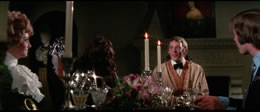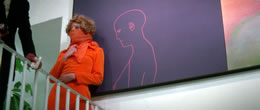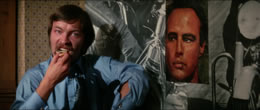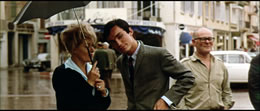
Color/B&W, 1968, 108m.
Directed by Michael Sarne
Starring Geneviève Waïte, Christian Doermer, Calvin Lockhart, Donald Sutherland, Glenna Forster-Jones
BFI (Blu-Ray/DVD) (UK RB/R2 HD/PAL) / WS (2.35:1)

Color/B&W, 1968, 108m.
Directed by Michael Sarne
Starring Geneviève Waïte, Christian Doermer, Calvin Lockhart, Donald Sutherland, Glenna Forster-Jones
BFI (Blu-Ray/DVD) (UK RB/R2 HD/PAL) / WS (2.35:1)
 A hot counterculture title in America and the UK for a few fleeting moments in the late '60s, Joanna was the first directorial feature for Michael Sarne, a still-busy actor/singer who decided to try his hand behind the camera. Like many films of the period, Joanna tosses together many aesthetic fads from the period like mixing up color and monochrome (a la A Man and a Woman), jaggedly editing together shallow focus shots to create a whirling sense of dislocation, indulging in random fantasay sequences, and hopping back and forth between quirky comedy and heavy drama. The film's reception proved warm enough for distributor 20th Century Fox to bring Sarne over to Hollywood for its big-budget version of Gore Vidal's Myra Breckinridge, a flawed but still fascinating film whose disastrous reception killed Sarne's American career on the spot.
A hot counterculture title in America and the UK for a few fleeting moments in the late '60s, Joanna was the first directorial feature for Michael Sarne, a still-busy actor/singer who decided to try his hand behind the camera. Like many films of the period, Joanna tosses together many aesthetic fads from the period like mixing up color and monochrome (a la A Man and a Woman), jaggedly editing together shallow focus shots to create a whirling sense of dislocation, indulging in random fantasay sequences, and hopping back and forth between quirky comedy and heavy drama. The film's reception proved warm enough for distributor 20th Century Fox to bring Sarne over to Hollywood for its big-budget version of Gore Vidal's Myra Breckinridge, a flawed but still fascinating film whose disastrous reception killed Sarne's American career on the spot.
 As for the film at hand, the title character is played by one-time fashion model Geneviève Waïte, the mother of actress Bijou Phillips who only went on to two more films, a throwaway cameo in Myra and a nameless object of obsession in the now-forgotten Elliott Gould curio Move, before recording a sought-after novelty album. The episodic story hurls this wide-eyed art student into the middle of mod late '60s London, where she learns the pleasures of interracial romance (with blaxploitation actor Calvin Lockhart, who would later go completely hambone in The Beast Must Die), develops a rapport with an ailing millionaire (Donald Sutherland, giving the film's best performance by far) who escorts her and some friends to Morocco, and mingles with the hip arty crowd before embarking off on her next adventure.
As for the film at hand, the title character is played by one-time fashion model Geneviève Waïte, the mother of actress Bijou Phillips who only went on to two more films, a throwaway cameo in Myra and a nameless object of obsession in the now-forgotten Elliott Gould curio Move, before recording a sought-after novelty album. The episodic story hurls this wide-eyed art student into the middle of mod late '60s London, where she learns the pleasures of interracial romance (with blaxploitation actor Calvin Lockhart, who would later go completely hambone in The Beast Must Die), develops a rapport with an ailing millionaire (Donald Sutherland, giving the film's best performance by far) who escorts her and some friends to Morocco, and mingles with the hip arty crowd before embarking off on her next adventure.
Joanna is the sort of aimless slice of atmospheric pop art that will either beguile viewers or leave them scratching their heads; it's no wonder a lot of people who came of age when it came out still regard it with deep affection, but anyone else's mileage will depend on their fondness for swinging kitsch. While Sarne's merits as a filmmaker are still open to debate, the film is certainly amusing to watch and features some frequently flamboyant, stunningly composed Panavision images (courtesy of Tom Jones' Walter Lassally), not to mention a bouncy opening credits sequence and an even better musical finale that sends the audience out on a wonderfully breezy note. Waïte really isn't much of an actress (and definitely doesn't give Julie Christie or Lynn Redgrave a run for their money in the '60s goddess sweepstakes), and despite her frequently skimpy or nonexistent fashions, her sex appeal here is pretty minimal; however, as a blank slate simply moving through picaresque encounters, she fits the bill adequately enough. Perhaps the most notable aspect of the film now is its unorthodox, pop/folk-influenced soundtrack by Rod McKuen, the songwriter of "Seasons in the Sun" fame who went on to The Prime of Miss Jean Brodie. His combination of songs and underscore still works very well here and often upstages the actors onscreen; it's a shame the soundtracks of both of these key scores are almost impossible to find now except on battered-up vinyl.
For reasons never really made clear, Joanna has never appeared on home video in America in any format; at least Myra Breckinridge got a cursory VHs release in the early days of Magnetic Video before it sat out the rest of the videotape era entirely. However, it did pop up on cable from time to time with no fanfare and surfaced letterboxed on the Fox Movie Channel in the late '00s, albeit looking pretty dark and mushy. Thankfully the BFI decided to come to the film's rescue with its dual-format edition (licensed from Fox, presumably) which presents a glorious HD overhaul representing the first time this film h as looked remotely impressive since first-run prints made the rounds decades ago. Bear in mind that this still looks like a fairly low-budget 1968 film, so darker scenes tend to have that flat, dated look inherent in the original film stock; however, this is leaps and bounds better than the film has ever looked on TV before and, for the most part, delivers a solid and extremely colorful viewing experience. Film grain doesn't appear to have been overly scrubbed out, either, which is a blessing in this case as the black and white sequences in particular rely on it for visual character. The mono audio sounds crisp and clear, and optional English subtitles are provided.
as looked remotely impressive since first-run prints made the rounds decades ago. Bear in mind that this still looks like a fairly low-budget 1968 film, so darker scenes tend to have that flat, dated look inherent in the original film stock; however, this is leaps and bounds better than the film has ever looked on TV before and, for the most part, delivers a solid and extremely colorful viewing experience. Film grain doesn't appear to have been overly scrubbed out, either, which is a blessing in this case as the black and white sequences in particular rely on it for visual character. The mono audio sounds crisp and clear, and optional English subtitles are provided.  The coolest extra here is Sarne's earlier half-hour short film, 1966's "Road to St. Tropez," a colorful and almost freeform Cinemascope romp through Continental Europe featuring an astoundingly young Udo Kier in his first role (way before Blood for Dracula and Story of O) along with Melissa Stribling (Mina from Horror of Dracula). The element here has obviously had a bit of wear over the years, but overall it still looks vibrant and quite watchable; for some viewers, this may be even more valuable than the main feature. The other short film is a completely insane 1968 short film, "Death May Be Your Santa Claus," a very stylized 37-minute depiction of interracial love and political activism with a groovy soundtrack by The Second Hand. No idea what on earth this one's actually about, but it would make a heck of a co-feature with Tinto Brass' Nerosubianco. Writer Chris Campion and Kodwo Eshun contribute liner notes to the illustrated booklet, and on the DVD only, you also get a pdf of Sarne's novelization of the film and a 16-minute interview with the director about his inspiration for the film and his original intentions which are now more commonly regarded as vintage psychedelia. You can also watch a video interview with him promoting the video release here.
The coolest extra here is Sarne's earlier half-hour short film, 1966's "Road to St. Tropez," a colorful and almost freeform Cinemascope romp through Continental Europe featuring an astoundingly young Udo Kier in his first role (way before Blood for Dracula and Story of O) along with Melissa Stribling (Mina from Horror of Dracula). The element here has obviously had a bit of wear over the years, but overall it still looks vibrant and quite watchable; for some viewers, this may be even more valuable than the main feature. The other short film is a completely insane 1968 short film, "Death May Be Your Santa Claus," a very stylized 37-minute depiction of interracial love and political activism with a groovy soundtrack by The Second Hand. No idea what on earth this one's actually about, but it would make a heck of a co-feature with Tinto Brass' Nerosubianco. Writer Chris Campion and Kodwo Eshun contribute liner notes to the illustrated booklet, and on the DVD only, you also get a pdf of Sarne's novelization of the film and a 16-minute interview with the director about his inspiration for the film and his original intentions which are now more commonly regarded as vintage psychedelia. You can also watch a video interview with him promoting the video release here.
![]()